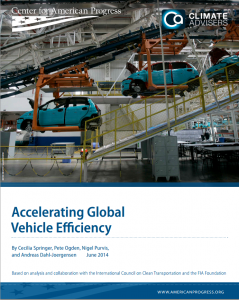Full Title: Accelerating Global Vehicle Efficiency
Author(s): Cecilia Springer, Pete Ogden, Nigel Purvis, and Andreas Dahl-Joergensen
Publisher(s): Climate Advisers and the Center for American Progress (CAP)
Publication Date: June 1, 2014
Full Text: Download Resource
Description (excerpt):
The U.S. government should lead a global effort to improve vehicle efficiency through more stringent, long-term fuel-economy standards for cars and trucks. Doing so would align interests in economic growth, energy security, public health, and climate protection across a wide range of countries. Oil consumption from road transport is increasing rapidly, contributing to increased emissions, especially in developing countries.1
Many countries already have efficiency policies to manage fuel consumption, but these policies need to be scaled up and expanded across a wider range of vehicles. Fortunately, consumer and industry acceptance of vehicle-efficiency policies is growing, paving the way for world leaders to set more ambitious efficiency standards.
Improved vehicle-efficiency policies are a political opportunity for world leaders. Leaders should conclude a nonbinding global agreement to increase the rate of efficiency improvement in vehicles. Leaders could strike this agreement at a number of upcoming global venues, including the U.N. Secretary-general’s 2014 Climate Summit and the 2014 G-20 Leaders Summit.
An agreement among all major economies is possible but may prove challenging or move slowly due to the differences in domestic policies and regional markets between countries. In the meantime, the United States should pave the way for a global agreement on vehicle efficiency by negotiating bilateral deals with key countries such as China, India, and Mexico. Thanks to new standards adopted during the Obama administration, the United States is now the world leader in fuel-economy standards for cars and trucks,2 and it should help other countries ramp up their own vehicle-efficiency policies through bilateral agreements. Doing so would demonstrate that vehicle efficiency has many benefits for these nations—some of the world’s largest vehicle markets—and could inspire other countries to join a global agreement.
